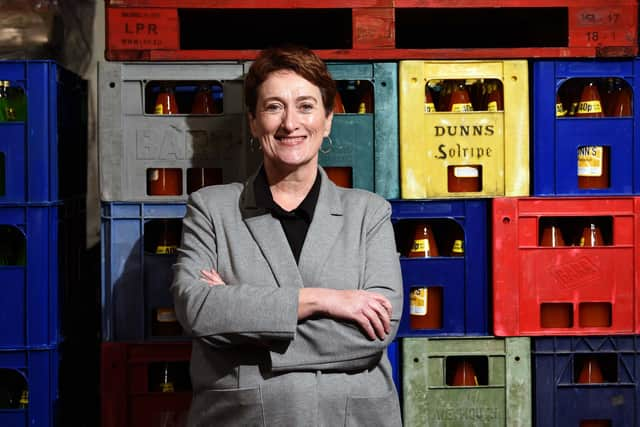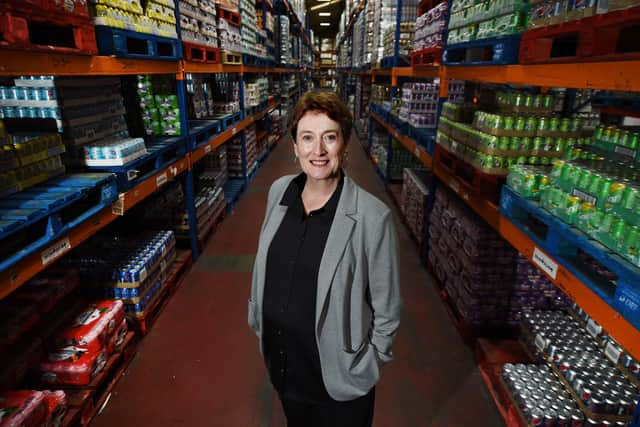The Big Interview: Julie Dunn, operations director at Dunns Food and Drinks
She describes starting out in Dunns’ small food depot in Stirling as the “defining moment” of her career, before making her way up the ranks and learning each part of the trade "wherever she was needed”.
The businesswoman now runs Dunns alongside managing director Jim Rowan, and the Blantyre-based firm can trace its roots back to 1875 when her great-grandfather Joseph Dunn set up a soft drinks business in the East End of Glasgow.
Advertisement
Hide AdAdvertisement
Hide AdHowever, it debuted in its current incarnation in 2001 following a management buyout off the distribution arm of the family firm, and says that today it is a “delivered wholesalers with a remarkable portfolio of craft beers, wines, spirits and food-products from around the world”, turning over more than £35 million and supplying around 2,000 customers.


Can you explain what Dunns Food And Drinks does, and how your role fits into that?
Dunns Food and Drinks is a delivered on-trade wholesaler. We deliver thousands of food and drinks products from hundreds of suppliers, largely to the Scottish hospitality trade.
My role holds me responsible for the warehouse, distribution and stock teams, insurances, the four-acre site, security, health and safety, and the fleet. If I sum it up in a word? Compliance – ensuring that we operate legally, safely, responsibly and delivering the best service we possibly can.
The historic firm started out in its current incarnation in 2001 – how did this come about?


Dunns Food and Drinks incorporated that year as the members of the third generation of the Dunn family prepared for retirement and wanted to exit their shareholding from the Joseph Dunn Group – a previous incarnation.
This allowed for a restructure engineered by my dad, Christopher, and our MD Jim Rowan, which moved the shareholding into three family groupings including the Rowans – the next generation of whom are already shaping us up for the digital era!
How quickly and severely were your operations affected by the pandemic? On the positive side, you started a home-delivery business, for example, and would you say lockdowns made people more aware and appreciative of the food supply chain?
Advertisement
Hide AdAdvertisement
Hide AdPrime Minister Boris Johnson suggested on March 16, 2020 that we should limit our interactions by avoiding pubs, bars and restaurants. There was a horrible week of waiting for the lockdown axe to finally fall, as orders petered out and customers requested stock to be uplifted.
In those early days there was so much to be considered and so many unknowns, we were wading through treacle.
The Job Retention Scheme was a relief – 60 per cent of our overhead was wages and with no money coming in, the capital we did have would quickly run out. We had 130 staff.
There are more families in the business than just the Dunns or the Rowans, and in some cases two or more wages going into a household were coming from the firm.
We still had our traditional soft drinks business servicing cash-and-carry and retail outlets, and we had a number of care homes requiring provision, so we had to stay open, but from April 1, 2020, a team of 130 became 31. Everyone else was furloughed.
Wholesale is one link ahead of hospitality in the supply chain so we had been filling our warehouse in preparation for Easter and the start of the season. Consequently, like many, we “pivoted” into consumer sales – either home deliveries or customer collections.
We worked with charitable organisations and local food banks to ensure as much as possible was put to good use, but as was the case for everybody supplying the hospitality and leisure industry, cash flow was a grave concern.
Very, very early on we knew we had to keep talking – to everyone. For example, we phoned and messaged customers to keep the contact.
Advertisement
Hide AdAdvertisement
Hide AdAs the reality of queuing outside a supermarket or the fear of the outside world for people shielding set in, we saw our home deliveries increase as well as an upturn in the independent convenience sector, and so another opportunity came along that saw us offering our craft beers and spirits into retailers.
Never had the food and drinks supply chain been so talked about as it was in the last few months of 2021. Consumers have come to realise that empty shelves do not mean we have run out of food, but rather indicate a rupture in the chain, be it fuel or labour shortages, the cost of shipping, border controls, a super tanker blocking the Suez Canal, or a pandemic with each part of the world experiencing different phases at different times.
You’re also president of the Scottish Wholesale Association (SWA) – how do you feel the sector has handled the pandemic, including the mental health impact, and has the level of support it has been given enough? The SWA last month noted that the Scottish Wholesale Food & Drink Resilience Fund had opened...
Wholesale is a resilient industry. All [firms] were affected by the pandemic and the SWA had to very quickly recognise and react to the needs of its members. Half of us, Dunns included, overnight lost upwards of 60 per cent of our turnover whilst the other half experienced unprecedented demand.
We all had to navigate new legislation, ways of working, and staffing issues. Our staff were fearful, stressed, furloughed, shielding, working too little, working too hard. We were all experiencing the same collective shock.
Our members came up with ways of ensuring inclusion and encouraging mental wellbeing, and we shared these initiatives with each other.
The role of the SWA was to ensure the Scottish Government understood the importance of a healthy wholesale sector to the supply chain, and to ongoing economic recovery.
Whilst many of our members are still experiencing difficulties coming out of the pandemic, it is a source of great pride that the Scottish Government is the only one of the four UK nations to recognise the importance of wholesalers within the supply chain, as substantial local employers, and to seek to compensate – at least in part – the losses we have suffered.
Advertisement
Hide AdAdvertisement
Hide AdCan you give your thoughts on the sustainability of delivered wholesale in the wake of COP26?
We as an industry have to be match-fit to be part of the fairer, greener economy, so over the last 12 months the SWA has launched two initiatives with its members.
That includes our Decarbonising Wholesale Project, where working in tandem with Arcola Energy, we are hopeful that our members will be amongst the first to operate using hydrogen-fuelled HGVs. This came on the back of a study undertaken with our members, the results of which were presented at several COP26 events.
We also introduced a local and regional sourcing training and education initiative, working with wholesalers and Scottish food and drink producers called Delivering Growth through Wholesale. This project has potentially such excellent consequences both for the economy and for the environment!
The firm in 2019 acquired Norfood – do you see potential for further deals/wider industry consolidation in the coming years?
We bought Norfood from a man who wanted to retire and whose family did not want to carry on the business. We bought our craft beer wholesale company, Dameck, some years before for the same reason. It remains our goal to grow our geographical coverage within Scotland and to increase our offering of specialist food and drinks products and therefore we will always be looking for opportunities to acquire and grow.
To what extent is being a family firm an advantage?
Being part of one that wants to stay a family business provides a sense of self and of a place in the world. I am always aware of who has gone before me and who may come after. The principal drivers therefore are longevity and survival, not lifestyle or personal wealth. This responsibility extends to all the families involved in the business and to the community in which we are based.
Who do you admire in business?
Those who see their business’ success as a means to bring benefits to many and who understand that as an employer they have a responsibility within the wider community to do good – my own dad as well as [Tunnock’s boss] Sir Boyd Tunnock and [entrepreneur] Lord Willie Haughey spring easily to mind. I can see around me, both at work and in my home life, the benefits they have brought to the local community by giving not just their money, but their time too. I realise it’s very 2019, but I do really admire Bill and Melinda Gates.
Advertisement
Hide AdAdvertisement
Hide AdWhat is your outlook for Dunns – and the broader wholesale market in Scotland – this year as we recover from Omicron, and further down the line?
My outlook is always positive. Quite simply, I look forward to looking forward.
A message from the Editor:
Thank you for reading this article. We're more reliant on your support than ever as the shift in consumer habits brought about by coronavirus impacts our advertisers.
If you haven't already, please consider supporting our trusted, fact-checked journalism by taking out a digital subscription.
Comments
Want to join the conversation? Please or to comment on this article.
